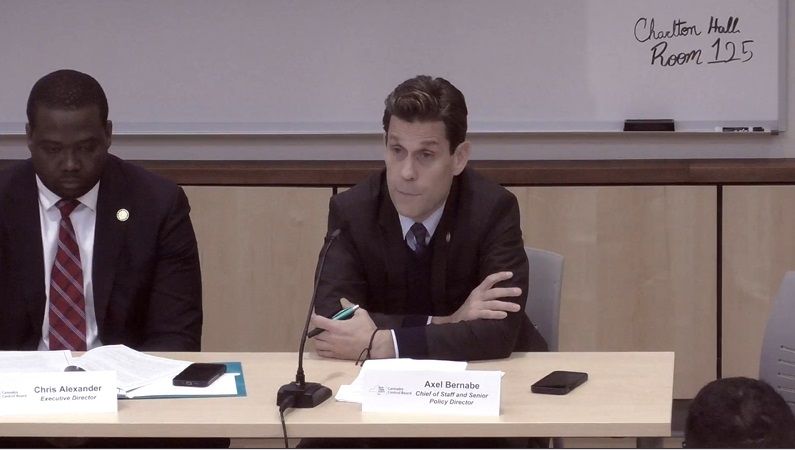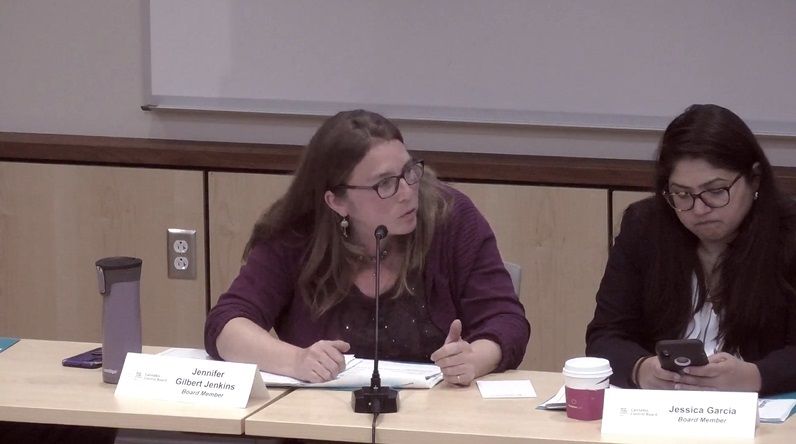It’s fair to say that the May 11, 2023 meeting of the New York Office of Cannabis Management (OCM) Cannabis Control Board (CCB) was perhaps its most dynamic yet. Many New Yorkers attended the session both live and virtually for updates about the 50 most recent licenses to be approved in the Conditional Adult Use Retail Dispensary (CAURD) program, 45 of which were awarded to applicants in regions previously stalled by an injunction. Yet while celebration abounded, other sections of the meeting sparked vigorous debate, particularly around the OCM’s revised industry regulations and the plight of the state’s cannabis farmers. As always, the cannabis space is constantly in flux.

New York's 50 Newest Conditional Adult Use Retail Dispensary (CAURD) Licenses
Kicking off Thursday’s session, CCB Chair Tremaine Wright couldn’t help smiling as she announced the latest CAURD licenses up for approval. “These brave souls have taken a leap and committed to opening cannabis businesses,” she said.
The CAURD program has been one of New York’s most significant efforts in licensing social equity applicants into the legal market. Eligible applicants must be either “justice-involved” entrepreneurs who have cannabis-related convictions (or are direct relatives of qualifying individuals), or a nonprofit organization with a mission that can demonstrably benefit from being involved in the cannabis industry. Because the OCM received over 900 applications during the limited window to participate in CAURD last year, the agency decided in March 2023 to expand the number of licenses from 150 to 300. A list of state-licensed dispensaries currently open for business can be found here, including those operated by or in partnership with nonprofits such as Housing Works (Housing Works Cannabis Co), The Doe Fund (Union Square Travel Agency), and the New York Urban League (Just Breathe.).
With the CCB’s approval of the newest applicants, New York State now has a total of 215 CAURD license winners. The majority of those awarded in Thursday’s meeting went to entrepreneurs in regions that had been affected by a lawsuit and injunction brought against the OCM in November 2022, which challenged the agency’s residency requirements for program applicants. Though the injunction was lifted on March 28 for four of the five impacted regions, there are still some battles ongoing. OCM Executive Director Chris Alexander confirmed that the final round of CAURD licensees, with 85 still to be granted, is intended to be approved at the next CCB meeting in June.

Office of Cannabis Management's Revised Regulations: Consumption Lounges, Processor Restrictions, and Potential Small Business Hurdles
As the session moved on to discuss the revised adult-use regulations, OCM’s Chief of Staff and Senior Policy Director Axel Bernabe noted that New York now has 279 licensed conditional cultivators, 40 processors and manufacturers, and the 215 dispensary owners. “This started with the mission from the legislature to go to as many states as possible and learn from their mistakes,” he explained. “What you’ll see in these regulations is a fundamentally updated approach to how states deal with cannabis.”
Among the revised regulations are rules for onsite consumption lounges for the first time, as well as new guidelines for existing medical dispensaries (Registered Organizations or ROs) to enter the adult-use market by December 29, 2023. Rules concerning what determines a “true party of interest” in a cannabis license have been changed, allowing parties to invest up to $250,000 in a venture without being considered an owner. Bernabe also referred to the recent legislation signed by Governor Kathy Hochul on May 3, which increases civil and tax penalties against illegal and unlicensed cannabis operations, with such businesses at risk of being fined up to $20,000 a day for unregulated sales. The unlicensed businesses conflict with the social equity principles at the core of the OCM’s policies, Bernabe said, because the agency has “zero tolerance for folks who are trying to jump ahead of our social equity applicants.”
A rather hot debate ensued when the CCB discussed the restrictions on processors to manufacture family-size or commercial products. Chair Wright pointed out that this creates pressure on small businesses, putting them at a disadvantage if they want to produce infused butters, syrups or other consumable products. Referencing brands in other industries like Carol’s Daughter that spent years developing as microbusinesses before profiting enough to expand nationally, she asserted that cannabis entrepreneurs need to be provided avenues to evolve from small to large in a natural way.
“These are the people who are making 1000 pieces,” Wright stated passionately, “and we have to find a space for makers and the maker community that allows them to compete as if they’re a micro, because that’s really who they’re operating as. And it is a pricing issue, and at this moment it appears as an equity issue, because it seems like a burden for anybody who just happens not to be in a place to grow.”
Board Member Jennifer Gilbert Jenkins agreed, particularly when looking at the products in the frame of what might supply consumption lounges. She questioned why venues that serve alcohol aren’t subject to the same measuring restrictions as those that might be serving cannabis. When Board Member Reuben McDaniel III mentioned that the measuring regulations took examples from other states, Jenkins drew applause with her reply, “Just because other states do it one way doesn’t mean we can’t do it better.”

Office of Cannabis Management's Social Equity Report: What Does New York's Historical Data Reveal?
Another conversation sparked around the topic of the OCM’s social equity report. Chief Equity Officer Damian Fagon and Tabatha Robinson, the agency’s Director of Economic Development Policy and Research, presented their report which explored equity approaches across the country. According to Fagon, the OCM is the first agency in New York’s history to use data to contextualize cannabis criminalization and share it with the public. The studies examined economic data, healthcare data, and arrest data over historical periods, particularly using Manhattan as a case study (which showed criminal charges being disproportionately leveled toward Black and brown communities).
Though McDaniel and Wright objected to the fact that the social equity report contained no actionable plan, Fagon and Alexander argued that the document should not overpromise to impacted communities, but instead evolve organically over time.
“This is a living document,” Alexander commented. “Laid out here is the infrastructure to do meaningful incubation of cannabis businesses across the state.”
Fagon, whose department interviewed over 400 cannabis industry workers whose families were affected by the War on Drugs, added to the live and virtual audiences: “Our team has tried to capture the depth of the injustices done to you and your families… I was reminded that the cruelty was always the point.”

New York's Cannabis Sales Report and Trouble For Licensed Cultivators
John Kagia, OCM’s Director of Policy, delivered an update on cannabis sales data. “We want New York to be the most data-driven regulated cannabis market in the world,” he enthused. The numbers showed that this past 420 was the most robust in the state’s history for cannabis sales, and that licensed stores are offering consumers products from 70-plus brands, “a great reflection of innovation and creativity” in the industry. Cannabis flower accounts for approximately 50 percent of sales, and Kagia attested that New Yorkers are discovering strong flower from their local brands.
However, when the meeting opened to public comment, cannabis cultivators appeared to tell a different story. Numerous licensed cannabis farmers stepped up to the microphone to express their hardships during the past year, including a season where they had no retailers or wholesalers to buy their crops, and incurring exorbitant debts to remain operationally compliant. Many read from a statement released by the Cannabis Farmers Alliance (NY Small Farma): “Without immediate relief, participants in the [Adult Use Conditional Cultivator] program will fail.”
Jeannette Miller, a community leader among the Cannabis Farmers Alliance and the New York Farm Bureau, championed the Cannabis Crop Rescue Act recently introduced by Assemblymember Donna Lupardo, which would authorize licensed cultivators to sell their own cannabis products and process their crops into distillate. Such an action would allow the distressed farmers the opportunity to make money without a middleman.
One cultivator, Justice Merkel, concluded, “Give us a chance as cultivators and I promise we will provide the best cannabis in the country.”
What do you think about the revised regulations and the topics discussed at the CCB meeting? Tell us about it - reach out at @honeysucklemagazine on Instagram and @HoneysuckleMag on Twitter!
For more information about New York State's cannabis industry, visit cannabis.ny.gov.
Find Out More On Social
--
Featured image: Cannabis Control Board Chair Tremaine Wright (center) conducts the May 11, 2023 meeting. Screengrab via Office of Cannabis Management's livestream.


